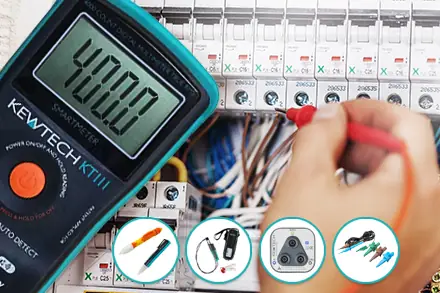Electrical testers are vital lifesaving tools for electricians, ensuring an easier, faster, and safer installation and maintenance process. This also ensures safety for both the installer and any electrical systems. This is an important part of any tool kit as electrical systems are in most places, and some of the hazards can result in electrical shocks, electrocution, burns, fires, and explosions. Hence, investing in a good quality electrical tester could end up being a life-saving asset.
Overall, there are a variety of electrical testers that are designed to check for voltage, amperage, continuity, shorted or open circuits, and improper wiring. Our electrical testers are designed to help you tackle any electrical problem with safety at the forefront.
Electrical Testers and Safety Regulations:
Aside from the safety element of electrical testers, they can also help users meet important electrical regulations.
For instance, the OSHA and the NFPA 70E Standard for Electrical Safety in the Workplace directs workers to de-energize all energized elements/parts to which a worker may be exposed unless energized conditions are required for troubleshooting.
In addition, a risk assessment is required by NFPA 70E Section 110.1(G) Electrical Safety Program, 130.3 Working While Exposed to Electrical Hazards, 130.4(A) Shock Risk Assessment, and 130.5 Arc Flash Risk Assessment.
Hence, an electrical tester would enable users to meet regulation requirements that aim to improve personnel and electric equipment safety.
Prior to electrical testing, determine:
- Whether the troubleshooting or testing is for the absence of voltage. If so, a non-contact proximity/non-contact voltage tester, an electrical tester, or a multimeter can be used.
- What the specific test equipment required is.
- Whether a safety backup is required.
- The voltage of the circuit.
- The Arc flash boundary – minimum “safe” distance from exposed energized conductors/circuit parts that have the potential for an arc flash. That is, the distance where a worker without appropriate PPE would receive second-degree burns.
- What the testers will be used for and how?
At the electrical testing stage ensure:
- The testers are rated for circuits and equipment where they will be used.
- Testers are suitable for the environment they will be exposed to.
- Testers are visually inspected for any defects and damages before every use and remove defective or damaged items when detected.
What are the different types of electrical testers:
1. Non-contact proximity/voltage testers
These allow users to check for voltage without having to make contact with any electrical parts. They are ideal for initial tests however; it is recommended to always follow this up with a direct-contact meter. Non-contact voltage testers can only test conductors or circuit parts phase-to-ground which is not helpful as the NFPA 70E requirement states that, testing circuit parts or conductors should be tested phase-to-phase AND phase-to-ground.
Other problems with proximity testers include:
- False negative indications occurring if the insulated test point touches grounded metal, the cable being tested is partially buried, the user is isolated from the ground, it is used inside a metal enclosure, etc.
The CK T2272A Non-Contact Visual and Audible Voltage Tester/Detector Pen Stick is a non-contact proximity voltage tester and detector pen that is perfect for non-contact AC voltage tests like earthing/ground connection checks, proper connection checks, and broken wire detection/locating. It utilises both audio and visual indicators in order to alert users to the presence of AC voltage with a bright Red LED and audible alarm sounding when AC voltage is detected. In addition, it is a high-sensitivity voltage tester that offers an extensive detection range of 70 to 1000 volts AC with a category 3 1000V rating. This device ensures protection against transient overvoltages and spikes in fixed installation testing and is safe to use near live circuits thanks to its double insulation. Its construction consists of an ergonomic dual component – pen-shaped – body for portability, with an integrated pocket clip, and an on-and-off switch to preserve the battery life.
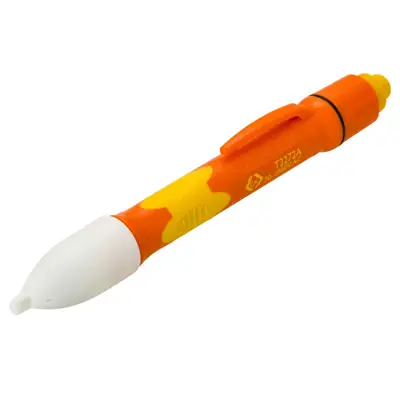
Key Features:
- Utilises both audio and visual indicators.
- Detection range of 70 to 1000 volts AC.
- REACH, RoHS, and WEEE compliant.
The Kewtech KEWSTICKDUO Non-Contact Voltage Tester Pen Stick with Dual Sensitivity is designed to instantly alert users to the presence of voltage from 90-600V AC without the need to make contact with a system as it is a non-contact proximity tester. It features dual-sensitivity, i.e., visual and audible indication with the Green LED indicating correct operation, the Red LED indicating voltage detection, and the two-tone buzzer (audible tone) indicating correct operation and voltage presence. When it is flashing both Red and Green, it indicates that the battery is low. Fortunately, thanks to the low power consumption circuits, the Kewtech non-contact voltage tester has a long battery life, and with an On/Off button and auto power off (after three minutes of inactivity), the battery life is conserved even more.
In addition, the Kewtech KEWSTICKDUO is CAT IV-rated. It also features a desensitising button that can be used to differentiate between live and dead/earthed cables just 18mm apart. Overall, this is an ideal, pocket-sized safety solution for any electrician’s toolkit.
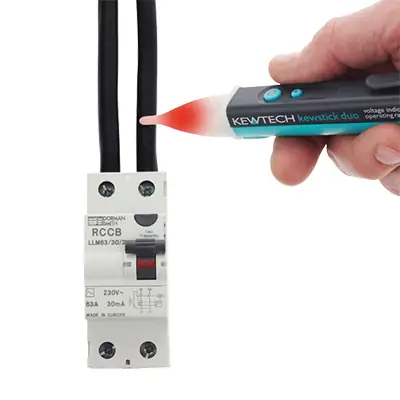
Key Features:
- Measuring Voltage – 90 to 600 V.
- Dual Sensitivity – visual and audible indication.
- CAT IV-rated.
2. Electrical Testers
Electrical testers are test equipment used to ensure a safe installation and maintenance process. They ensure users continue to work in safe environments through faster diagnosis. They also ensure your wires and electrical devices are protected against damage.
3. Digital Multimeters
Digital multimeters allow users to test for a range of voltage or electrical issues in a single device. They are very versatile, incorporating different testing functions whilst ensuring accurate contact measurements that determine if a circuit is energized.
The Kewtech KT111 500v AC/DC TRMS Digital Multimeter is an intelligent ‘smartmeter’ that offers an auto selection for AC and DC voltage and resistance. To use, simply turn on the multimeter using the central button, it will then auto-detect whether there is voltage present and whether it is AC/DC. It will then automatically select the correct function and range for resistance or AC/DC voltage measurements, testing AC/DC voltage up to 500 volts AC/DC. It features a data hold function with a large LCD display that allows users to record readings at their convenience.
In addition, it is an incredible test equipment that can work out which function to measure without having to select it first and perform resistance measurements and continuity tests with visual and audible tone indications. It is ideal for alarm engineers and contractors involved with fault-finding on AC and DC panels. The KT111 is compliant with IEC61010-1, CAT III 500V standards.
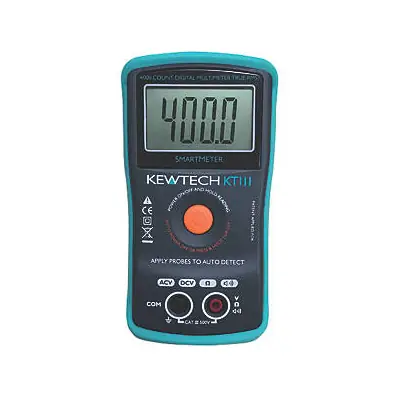
Key Features:
- Testing AC/DC voltage up to 500 volts AC/DC.
- Single button operation – ensuring ease and efficiency of use.
- Compliant with IEC61010-1, CAT III 500V standards.
- Comes complete with the KT111 digital multimeter, test leads, a protective holster & an instruction manual.
Other electrical test equipment’s:
The Kewtech KEWCHECK R2 Mains Socket Circuits Testing Adaptor is compatible with most insulation or continuity and malfunction testers from a range of manufactures including Megger, Seaward, Fluke, Robin, Metrel, and DiLog. It works with insulation, continuity testers, and multi-function testers that use 4mm connectors. It also facilitates R2, R1+R2 measurements and voltage detection at socket outlets. In addition, users can achieve R2 measurements more efficiently when the Kewcheck 2 testing adaptor is used in conjunction with the ACC50MTL test lead.
To use, the Kewcheck R2 plugs directly into the socket that needs testing, and then a quick and simple connection to each of the plug’s wires thanks to the three outlets featured for attaching test leads.
The KEWCHECK R2 mains socket circuits testing adaptor is more commonly used to speed up periodic 17th edition testing and Part P testing of UK electrical installations. It is also a popular choice due to its damage free design, allowing users to perform tests or check wiring internals without having to remove the socket.
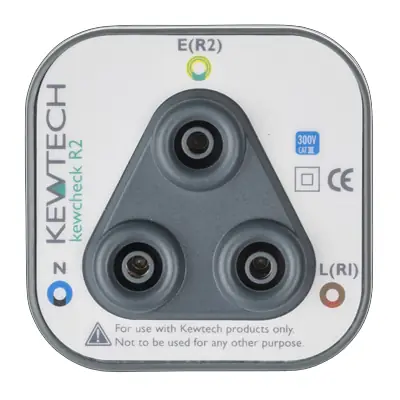
Key Features:
- Measuring Voltage – 300 volts.
- Superior test results due to more secure connections.
- CE approved.
The Kewtech ACC016E 3 Wire Fused Distribution Board Test Lead Set with IEC Plug comes complete with 1 x 3 wire distribution board lead, IEC mains connector, 2 fused crocodile clips & 2 probes. It is compatible with a wide range of other testers provided they have the necessary connector; hence, it is suitable for use with multimeters, PAT testers, multi-function testers, etc,. The test leads are extensively tested for durability as they are subjected to pull out, bending stress, twisting and temperature tests for maximum performance. In addition, the ACC016E features a piggy bank arrangement on the earth leads, facilitating two wire testing.
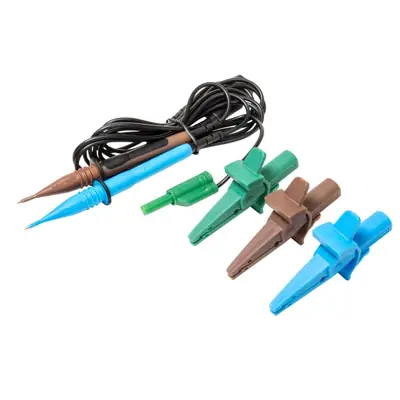
Key Features:
- Piggyback arrangement – facilitates two wire testing.
- Strong G7 distribution board test leads.
The Kewtech KEWISO2 690v AC/DC Safety Isolation Kit with Voltage Tester, Proving Unit and Lock Off Device is an electrical tester device required for correct and safe isolation procedures, allowing you to ensure your installations comply with Electricity at Work regulations. It is designed to fit into recessed terminals such as RCBOS without the need to unscrew any caps. It offers a range of tests such as continuity, self-diagnostic and single pole phase tests to ensure accurate operation.
The kit comes in a durable carry bag with a shoulder strap and a transparent window that allows easy access to the proving unit without needing to remove it. In addition, the kit houses a dedicated two pole voltage tester (KT1780), high output proving unit (KEWPROVE3 – up to 690V and stepping down the voltage 400V, 230V, 100V & 50V – this unit will drive even the most high current voltage detector), and a locking off device (KEWLOCK – fits all MCBs and toggle main switches) with universal lock-off for all toggle type switches and rewritable warning labels to guard against unintentional energising of isolated circuits.
The KT1780 voltage tester indicates 12 – 690V with clear LEDs for clarity even when the batteries are flat. It also features a clear, oversize luminous LED indication that offers ample illumination.
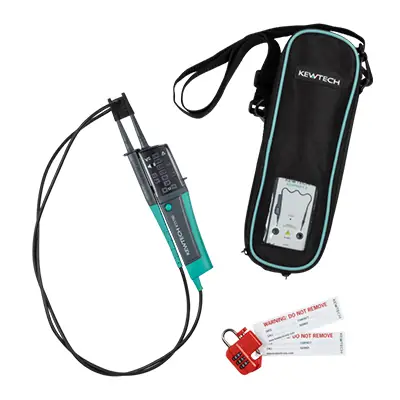
Key Features:
- AC & DC Voltage tests up to 690V.
- Range of tests you can carry out such as, continuity test, self-diagnostic test and single pole phase test.
- The KT1780 meets IEC 61243-3, IEC 61010-1 and measurement category CAT IV 600V standards.
In conclusion, investing in a high-quality electrical tester can be lifesaving, and can also save you thousands of pounds in electrical damages. It will also ensure your electrical installations meet the necessary electrical requirements for user and equipment safety.
Our range of testing equipment covers all your testing needs from multi-purpose testing kits to specialised sensors. This allows you to benefit from faster diagnoses, and the comfort of knowing that you’re working in a safe environment!

